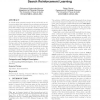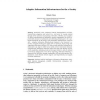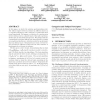195 search results - page 39 / 39 » Autonomic and Trusted Computing Paradigms |
ATAL
2009
Springer
13 years 11 months ago
2009
Springer
In several agent-oriented scenarios in the real world, an autonomous agent that is situated in an unknown environment must learn through a process of trial and error to take actio...
ATAL
2004
Springer
13 years 10 months ago
2004
Springer
Abstract. Positioned at the confluence between human/machine and hardware/software integration and backed by a solid proof of concept realized through several scenarios encompassin...
BIOADIT
2006
Springer
13 years 8 months ago
2006
Springer
Life-like adaptive behaviour is so far an illusive goal in robot control. A capability to act successfully in a complex, ambiguous, and harsh environment would vastly increase the ...
AAAI
2008
13 years 7 months ago
2008
This paper examines, by argument, the dynamics of sequences of behavioural choices made, when non-cooperative restricted-memory agents learn in partially observable stochastic gam...
PODC
2009
ACM
14 years 2 months ago
2009
ACM
In this paper, we study the wireless synchronization problem which requires devices activated at different times on a congested single-hop radio network to synchronize their roun...



